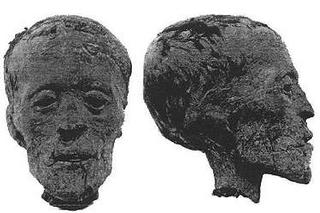The Orthodox church will on Sunday take the unprecedented step of canonizing someone already revered as a saint by Roman Catholics, amid ceremonies marking Hungary's millennium as a nation state.
Published:
22 August 2000 y., Tuesday
Constantinople Patriarch Bartolomaios I will formally announce the decision of the Orthodox bishops to canonize Stephen I -- Hungary's founding monarch -- as an Orthodox saint, Cardinal Istvan Paskai told reporters this week.
Stephen I, the ruler of Hungary between 997-1038, was canonized by the Catholic Church in 1081. During his lifetime he campaigned to convert and settle nomadic Hungarian tribes and asked to be crowned by Pope Sylvester III, setting up a Christian state here in the year 1000.
Religious fervor is expected to grip Hungary from Sunday, when nationwide celebrations begin to mark the 1,000th anniversary of the foundation of their nation.
Precious relics -- fragments of the skull of Saint Stephen I (969-1038 AD) and his right hand -- arrived earlier this week on loan from a monastery in Dubrovnik, Croatia, where they have been kept for at least the past 450 years.
And after a break of 62 years, a Papal legate will attend the celebrations. Cardinal Angelo Sodano, representing Pope John Paul II, will read out a message from the pope to the Hungarian people.
Some 67 percent of Hungary's population of 10 million are Catholics, with only a minority in the Orthodox church. There was a rejuvenation of all religions when multi-party democracy was restored in Hungary in 1990, following 43 years of persecution under the Soviet satellite regime.
St. Stephen's relics will be carried in a procession through the streets of Budapest on Sunday and into the parliament building where the monarch's crown is on display.
Šaltinis:
Central Europe Online
Copying, publishing, announcing any information from the News.lt portal without written permission of News.lt editorial office is prohibited.
The most popular articles
 Forget burning bras, the latest in "women's liberation" is a product making a comeback in Japan that makers claim allows women to ditch tight-fitting underwear - loincloths.
more »
Forget burning bras, the latest in "women's liberation" is a product making a comeback in Japan that makers claim allows women to ditch tight-fitting underwear - loincloths.
more »
 We revel in the ways in which mobile phones and wireless internet make our lives easier.
more »
We revel in the ways in which mobile phones and wireless internet make our lives easier.
more »
 For almost a decade a series of laws have protected Europe's workers from discrimination on the basis of age, disability, sexuality or religious beliefs.
more »
For almost a decade a series of laws have protected Europe's workers from discrimination on the basis of age, disability, sexuality or religious beliefs.
more »
 Earth Hour 2009 is an opportunity for hundreds of millions of people all around the world to switch off their lights as a demonstration, a symbolic action to show to governments we need you to take action on climate change.
more »
Earth Hour 2009 is an opportunity for hundreds of millions of people all around the world to switch off their lights as a demonstration, a symbolic action to show to governments we need you to take action on climate change.
more »
 From 4-7 June millions of people will have their chance to vote in the European Parliament elections.
more »
From 4-7 June millions of people will have their chance to vote in the European Parliament elections.
more »
 One town in Poland has just started a "rent-a-grandparent" programme.
more »
One town in Poland has just started a "rent-a-grandparent" programme.
more »
 A key component of the EU's internal market for goods and services is the possibility of buying and selling across Europe.
more »
A key component of the EU's internal market for goods and services is the possibility of buying and selling across Europe.
more »
 Polish farmers are intimidated by the mysterious predator.
more »
Polish farmers are intimidated by the mysterious predator.
more »
 The costs of fossil fuels are increasing and global warming is accelerating.
more »
The costs of fossil fuels are increasing and global warming is accelerating.
more »
 According to archaeologists, the mummy of a 50-year-old woman, discovered on San Lorenzo island, was most likely an elite member of the Pre-Incan Ichma culture.
more »
According to archaeologists, the mummy of a 50-year-old woman, discovered on San Lorenzo island, was most likely an elite member of the Pre-Incan Ichma culture.
more »